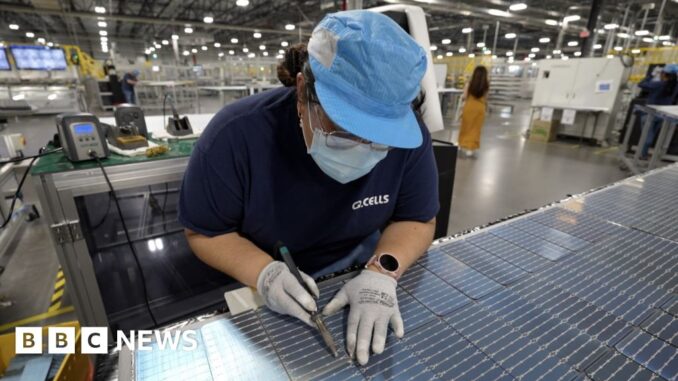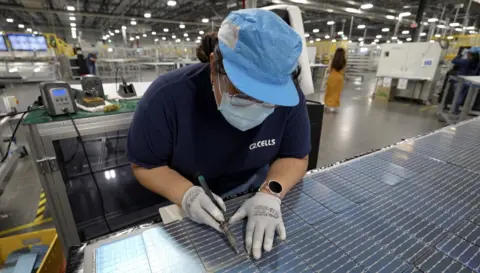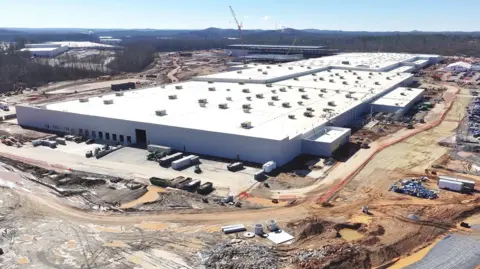
 BBC
BBCThe former “carpet capital of the world” is getting a multi-billion-dollar makeover.
Here in the rural Georgian town of Dalton, once known for its fabric floor coverings, a Korean company called Qcells is spending $2.5bn (£2bn) to expand its solar panel factory, with another in the works.
It’s a bold initiative that will create 2,500 quality jobs in the next 12 months, in an area where the average household income is roughly 27% below the national average. It is hoped the project will revitalise a corner of the US whose glory days seemed over.
And it’s due in no small part to someone many of the residents of this Republican district would rather not credit – Joe Biden.
The president’s landmark 2022 Inflation Reduction Act (IRA) – his signature green legislation – offered hundreds of billions of dollars in tax incentives, credits and loans to stimulate American manufacturing in clean energy.
The most ambitious climate legislation in US history has generated a tsunami of private sector investments, with big implications for the rest of the world. And Georgia – a state President Biden hopes is in play in this year’s presidential election – has been a big beneficiary.
But with four months before the president goes head-to-head against Donald Trump, the billions of dollars of new investment in this key battleground state doesn’t appear to have lifted the incumbent’s support.
President Biden’s pitch is that solving the climate problem is also good for jobs. Since the law was passed, more than 300,000 clean energy jobs have been created in the US, according to the advocacy group Climate Power.
And there’s no doubt it’s creating opportunities in places like Dalton. Here you see Bidenomics in action – foreign and government money being used to fight climate change and build an economy from the middle out.

Scott Moskowitz, head of market strategy for Qcells, says that Georgia had been a great home since 2019, but that the IRA had been an “accelerant”. Without it, he muses, the current expansion might not have happened at all.
“What our industry has seen, since the IRA has passed, is more investment in the past two years in solar and clean energy manufacturing than the previous 20 years,” he says.
And yet that message either isn’t getting through or simply isn’t resonating with locals – not even local Democrats.
Jan Pourquoi, the spokesperson for the local Whitfield County Democratic Party, tells me: “In the business community, there is a resentment against that company [Qcells].”
Mr Pourquoi, a Belgian expat should know. He owns one of the small carpet firms in town. We spoke in his office, overlooking the factory floor where they turn flooring remnants into small rugs.
“The business community resents the fact that we have a company from South Korea coming in this area with government subsidies, while they themselves get nothing from the government,” says Mr Pourquoi, who identified as a Republican before switching parties following Trump’s election in 2016.
He tells me that local voters know little about the IRA law. “Nobody cares about clean energy, not around here. That is the type of stuff that I would call the ‘latte liberals’ care about in the big city.”
 Qcells
QcellsWell, at least one person does, and that’s Marjorie Taylor Greene, the firebrand Republican congressional representative for the district. She has touted Qcells’ expansion, despite voting against the law that helped make it possible.
It’s creating some awkward dynamics for Republicans. The IRA is in Donald Trump’s sights.
If Republican lawmakers win big in the Congressional elections that are also taking place on 5 November, then portions of President Biden’s signature climate law could be repealed, threatening a clean energy boom happening in their communities across the US.
I sat down for coffee with Kasey Carpenter, Dalton’s Republican member in the Georgia House of Representatives. We met at Oakwood Café, the bustling diner he owns along with a string of other local businesses, including a pizza joint and a boutique hotel.
Mr Carpenter downplayed the potential impact on Qcells of manufacturing tax credits being rolled back. He doesn’t think it would jeopardise the solar investments in his district.
But he adds that if clean energy investments were to become at risk “I’m sure we’ll be speaking with the Trump team”.
Our conversation ends with him saying it would be another feather in Dalton’s cap if this carpet town could also lay claim to the title of “solar panel capital of the world”.
But that belongs to China, which controls 80% of the world’s solar panel supply chain.
For years China has been investing heavily in renewable energy, and is expected to spend a staggering $675bn in 2024, according to an International Energy Agency (IEA) report.
To compete, governments around the world have begun throwing hundreds of billions at the green industries of the future.
In the EU, investment in clean energy is set to increase to $370bn in 2024, according to the IEA. The predicted figure for the US is $315bn.
US Trade Representative Katherine Tai said last year that she hoped the US’s increased spending on renewable energy would help address the “significant distortion” in the global economy caused by China.

The aim is also to deny China any more of an opening into the US renewables market.
And these massive green investments are being channelled by the Biden White House, very purposefully, into so-called red states – those that usually vote Republican. The hope is to create a manufacturing revival before November’s presidential election.
For those who work in the Qcells’ factory, the opportunity has been life-changing.
Robots patrol the shop floor where solar cells are being packaged into panels. That’s where I meet Alan Rodriguez, dressed in a black polo shirt emblazoned with the Qcells’ logo.
He traded work in a Dalton carpet mill for Qcells shortly after the solar panel maker opened its first site in 2019. Mr Rodriguez started in an entry level position, before learning advanced skills, and progressing to a spot on the engineering team.
The speed of advancement was something he never dreamed of when he worked in the flooring industry.
“For me it’s been great,” Mr Rodriguez says as he walks down the production line. “The jobs are much better, the environment. It’s a clean facility.”
President Biden is counting on people like Alan Rodriguez to help swing red states his way in November.



Be the first to comment